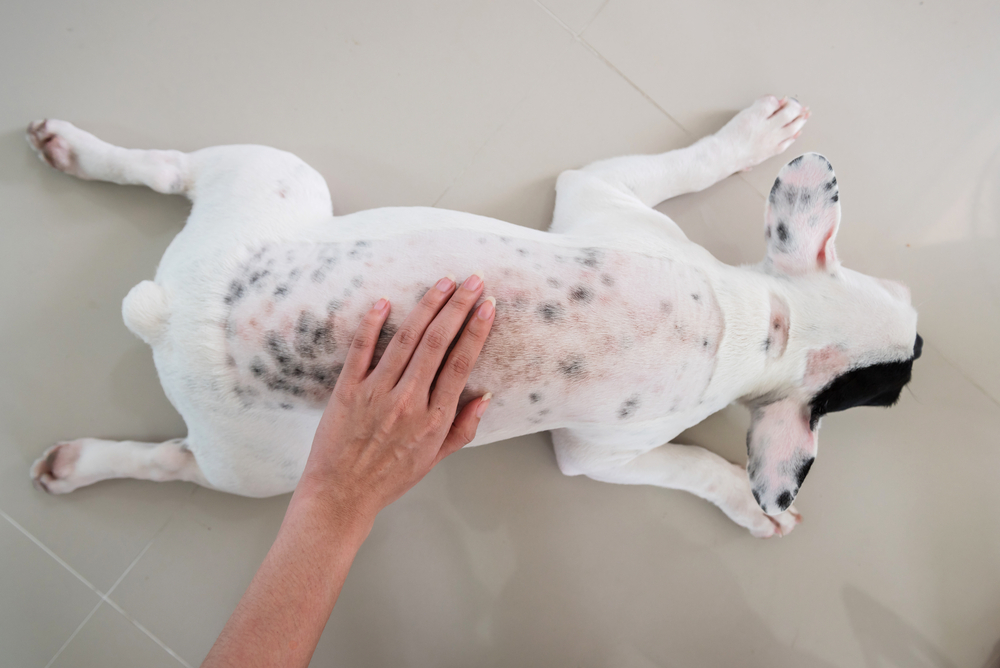Itchy-Scratchy: Help for Dogs with Dry Skin

Dogs with dry skin can be suffering for a number of reasons, including parasites and allergies. Itchy skin is not only unpleasant for your dog but can result in skin problems over time. If your dog is scratching more than normal, they may have dry skin and a possible health condition that contributes to it.
The team at Oakland Veterinary Referral Services will scratch the surface of why dogs have dry skin so that you can help give your best fur friend some relief.
Dogs with Dry Skin: Symptoms and Causes
Dry skin is itchy and uncomfortable, and can result in skin problems and potential infection when left untreated. If your dog has dry skin, you may notice one or more of the following symptoms emerge.
- Scratching, licking, and biting at the skin
- Rubbing body and/or head on floor and furniture
- Scaly skin
- Scabs
- Rashes/inflammation
- Bald spots
- Bumps
- Open sores
Skin conditions may seem like a small issue, but it can signal bigger health problems. Dry skin is hard to accurately diagnose without help because of the myriad causes that can contribute to this uncomfortable issue. Causes of skin dryness in canines include:
- Changes in the season – When winter comes, and we make use of the furnace, many people and pets experience dryness of the skin. This is why hydration and humidity are so important any time of year.
- Parasites – Fleas, mites, and other parasitic infestations can cause a number of skin problems (and health risks) that can result in dry skin.
- Diet – Low-quality foods or food allergies often manifest as changes in the health of your pet’s skin and coat.
- Seasonal allergies – Another common form of allergies in dogs comes from environmental or airborne allergens, such as pollen, grasses, and mold. Most allergies cause skin conditions in dogs, including that chronic itching you may witness in your pet.
- Shampoos and chemicals – Some dogs are sensitive to ingredients found in shampoos, from dyes to chemicals, as well as laundry detergent, carpet cleaners, and cleaning supplies. This causes skin reactions, such as dryness.
- Fungal infection – Ringworm and yeast overgrowth cause problems of the skin, such as rash, inflammation, scaling, and bumps.
- Infection – Bacterial and fungal infections are caused by a preexisting condition, including skin problems as a result of chronic licking and scratching.
- Hormonal imbalance – Skin problems are a common indicator of hormonal issues in pets.
- Ichthyosis and other primary scaling disorders – A rare condition resulting from a recessive genetic mutation. It is seen in certain Terrier breeds, Doberman Pinschers and Cavalier King Charles Spaniels.
Dogs with Dry Skin: Treatment
How to treat dry skin on dogs? The first thing is to have them examined. Treatment depends on the underlying cause, and once treatment begins, the dryness should improve. Other ways to help your pet with problems associated with dryness are:
- Keep your dog on a flea and tick preventative.
- Feed your pet a high quality diet and address any food allergies.
- Use a mild shampoo specifically designed for dogs, as well as a conditioner.
- Use a gentle hypoallergenic conditioning shampoo and spray on conditioner.
- Brush your dog regularly.
- Avoid having your pet interact with dogs with scaling or itching, unless the cause is known to be non-contagious.
- Use a humidifier in the home.
- Speak with your veterinarian about your dog’s food and possibly supplementing Essential Fatty Acids (especially Omega 6) that improve skin and haircoat.
As always, if your pet is having skin and coat issues, it’s important that your veterinarian see them to rule out health problems. For more information on helping dogs with dry skin, or to schedule an appointment, please contact us.


